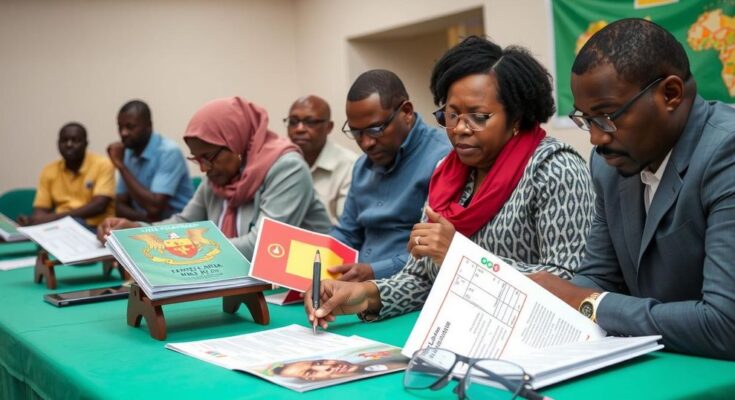Namibia’s Electoral Court ruled that opposition parties IPC and LPM can examine electoral materials from recent elections, amidst claims of irregularities and suppressed voter turnout. The ruling could lead to a legal challenge against the election results, where SWAPO retained control but with a reduced majority. Debate continues about the impact of logistical issues on the elections.
On Friday, three judges from Namibia’s Electoral Court ruled in favor of two opposition parties, allowing them to inspect the electoral materials from the recent presidential and legislative elections. The Independent Patriots for Change (IPC) and the Landless People’s Movement (LPM) have contested the election results, which indicated that the SWAPO party, the incumbent party since independence, maintained its parliamentary majority, albeit diminished. These opposition parties are seeking to uncover any irregularities that may have occurred during the elections, claiming that voter turnout was adversely affected in some regions due to insufficient ballot papers.
While there are allegations of logistical irregularities, critics assert that these issues do not substantively alter the final outcome of the elections. John Nakuta, a human rights lawyer and lecturer, commented on the efforts of the IPC and LPM, noting their intention to gather evidence of alleged discrepancies. “They want to investigate as to establish evidence whether there was irregularities and then after they would then, I suppose, come back to ask the court to nullify based on the evidence they would produce,” Nakuta explained.
Imms Nashinge, a spokesperson for the IPC, articulated that the recent judicial ruling marks the preliminary phase of their legal challenge, which they plan to pursue in the coming week. Nashinge stated emphatically, “We made it clear that we are not accepting anything from this sham of an election from day one.” He indicated that support from other political entities underscored a collective rejection of the election results prior to their announcement.
Elections Commissioner Pius Iikwambi conveyed that the commission had previously established an agreement with the concerned parties that allowed them to inspect the election materials, emphasizing that this court ruling merely reiterated that arrangement. De Wet Siluka, a spokesperson for the commission, highlighted that the objectioning political parties had not taken advantage of the opportunity to oversee the electoral process as it unfolded, complicating their current claims.
In the recent elections, 22 political parties vied for positions, with 13 securing seats in the National Assembly, where SWAPO continues to hold a majority with 51 active seats. Although the court’s ruling permits opposition parties to scrutinize the results documentation, the effectiveness of this inspection in substantiating their claims remains uncertain.
The backdrop to this ruling involves the recent presidential and legislative elections in Namibia, heavily marked by allegations of irregularities from opposition parties. SWAPO, the long-dominant party in Namibian politics, retained control of parliament despite a diminished majority, prompting the IPC and LPM to question the legitimacy of the electoral process. The concerns raised include claims of suppressed voter turnout and inadequate provisions for ballot papers in key areas, elevating the stakes for the upcoming legal challenge.
The ruling by Namibia’s Electoral Court granting opposition parties access to electoral materials comes amidst significant contention regarding the legitimacy of the recent elections. The challenges articulated by the IPC and LPM point to broader issues within the electoral process, while the elections commission defends its operations against claims of irregularities. The outcome of subsequent investigations by these parties may ultimately influence the political landscape moving forward.
Original Source: www.voanews.com




